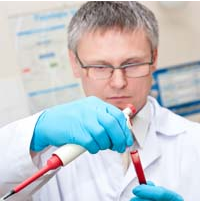
Mesothelioma is a rare cancer caused by exposure to asbestos. It strikes about 2,500 people in the U.S. each year. But its rarity – and its tendency to mimic other lung-related diseases – can make mesothelioma hard to diagnose. In recent years, some mesothelioma centers have begun evaluating the DNA composition of suspected mesothelioma cells using a test called a DNA array.
Now, a group of researchers in California reports that a different type of evaluation – one that looks for abnormal sugars (glycans) in blood serum – may offer another diagnostic option for mesothelioma. Anti-glycan antibodies are produced by the immune system in response to certain malignancies and viral diseases. This unique cancer diagnostic approach uses a printed glycan array (PGA) test, similar to a DNA array, to measure the binding of these anti-glycan antibodies and compare them with the glycans on the array.
In this pilot study of the PGA biomarker test, researchers evaluated samples of blood serum from 50 patients with malignant mesothelioma and from 65 patients who had been exposed to asbestos but had no mesothelioma symptoms. Researchers hope the PGA biomarker tests will help with early detection, diagnosis and prognosis of mesothelioma as well as help identify new therapeutic targets.
The study conducted by the Department of Computer Science at San Diego State University and funded by the National Cancer Institute, lays out the procedures for data preprocessing, quality control, data analysis, evaluation and visualization of the new PGA biomarker platform. The PGA array was developed in collaboration with researchers at NYU Cancer Center and in Russia.
The current biochemical tests for diagnosing mesothelioma include immunohistocehmistry (IHC). These IHC tests look for specific antibodies such as CEA, calretinin, cytokeratin 5/6, thrombomodulin, and N-cadherin. The advantage of the anti-glycan tests over the IHC tests is that the former can be performed on blood serum while the latter require mesothelioma tumor cells.
Contact and ask Dr. Gill about this test and other questions about mesothelioma, as well as chances of being part of a clinical trial for a cure: ASK DR. GILL here
